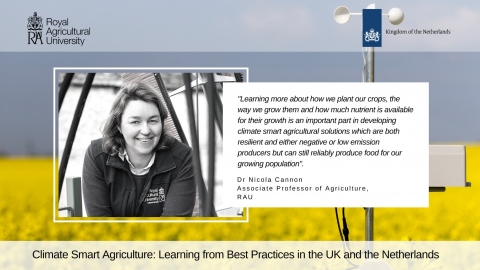RAU co-hosts Climate Smart Agriculture webinar with the Embassy of the Kingdom of the Netherlands
23 Nov 2020
Held on 3 November, the webinar provided a timely opportunity to share best practice and leading policy initiatives in both the Netherlands and the UK.
In his welcome, Dutch Ambassador Karel van Oosterom highlighted the threat climate change poses to our agrifood systems. Ambassador van Oosterom called attention to the commonalities in the UK and Dutch farming sectors and the potential for the exchange of knowledge and best practices between stakeholders in the UK and Dutch sectors. The Dutch government supports a transition towards an agrifood system that incorporates circular economy principles and is climate smart.
Royal Agricultural University (RAU) Vice-Chancellor Professor Joanna Price welcomed some 300 delegates and spoke of the similarities our two countries share and also the important role of evidence-based research in focusing farmers and the wider land-based sectors on being climate smart.
The speakers presenting in support of these themes were Pieter de Wolf, Project Leader, Farm of the Future at Wageningen University, the Netherlands, Sophie Alexander, whose farm at Hemsworth is an organic 410-hectare, Agri-Epi Satellite Farm in Dorset and Dr Nicola Cannon, Associate Professor of Agriculture, RAU.

All speakers provided practical examples, via videos or live presentations, of what climate smart agriculture looks like in practice. Pieter de Wolf said that resilience, in both farm and farmer, is critical to success. Sophie Alexander emphasised the need to be both ecologically and financially resilient in the face of climate change and the importance of production and delivering ecological benefits together e.g. improved soil and biodiversity. Dr Cannon said prolonged periods of both drought and rain are two crucial challenges in successful climate change adaption and talked about her research of cultural cultivation techniques and a move away from monocultures as a way of dealing with these issues. She highlighted that the role of land not only in food production, but also in supporting rural economies, complex ecosystems and wider biodiversity needs to be examined.
Louise Manning, Professor of Agri-food and Supply Chain Security, chaired the webinar and summarised these presentations, saying the language we use to describe climate smart agriculture is complex. Resilience, renewal and restoration are mentioned as much as technology and innovation, indicating the need for a rounded approach to consider what best practise is in climate smart agriculture.
A panel discussion followed and the speakers were joined by Inge Lardinois, Head of the Plant Agri Chains Unit at the Ministry of Agriculture, Nature and Food Quality, the Netherlands, Luke Halsey, Investment Director, AiiM Partnership and Phil Jarvis, UK National Farmers Union Environmental Forum Chair. Inge Lardinois spoke about the Agriculture Climate Adaptation Action Programme in the Netherlands, introduced to deliver climate smart agriculture, and of the particular challenges her country faces with regard to climate change adaption given the extent of the droughts, heavy rain, flash floods and hail storms experienced over the last three years. Luke Halsey talked about issues around the delivery of climate smart agriculture, in particular the sourcing of potential funding. He said support options are emerging from both venture capital and private funding as well as public funding from governments. Phil Jarvis highlighted the problems we face in developing and embedding UK landscape level policy and farming practise to ensure “net zero” is achieved.
Abundant questions from the audience included: how we get policymakers to engage with farmers; how we communicate current innovation between all stakeholders to cascade it more widely; options for mapping natural capital and developing farm plans for carbon mapping and biodiversity; and “if “net zero” comes at a cost then who pays for that cost and how?” The session ended with the panel’s response to a question on what success looks like at the farm level, landscape, national and international level in climate smart agriculture adoption? The conversation continues …
Professor Louise Manning summarised the webinar by saying that climate smart food and agriculture are about “growing smart; buying smart; living smart; eating smart; being smart…”